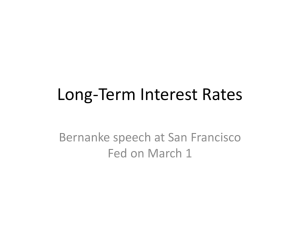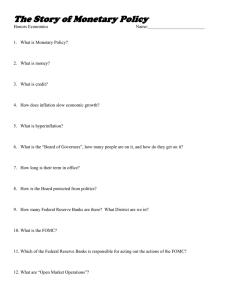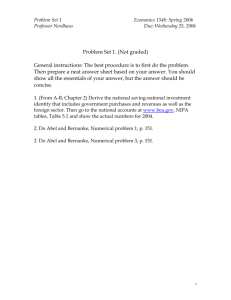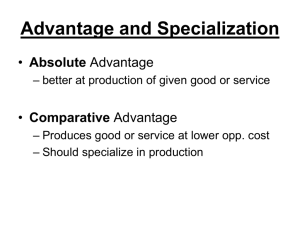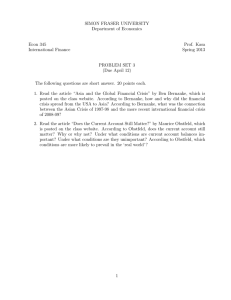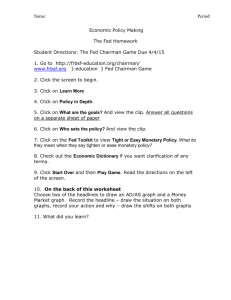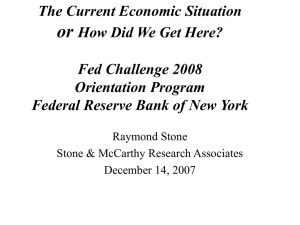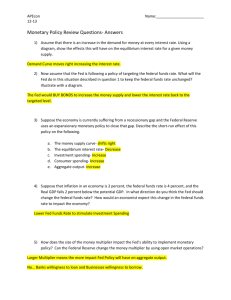Document 14343906
advertisement
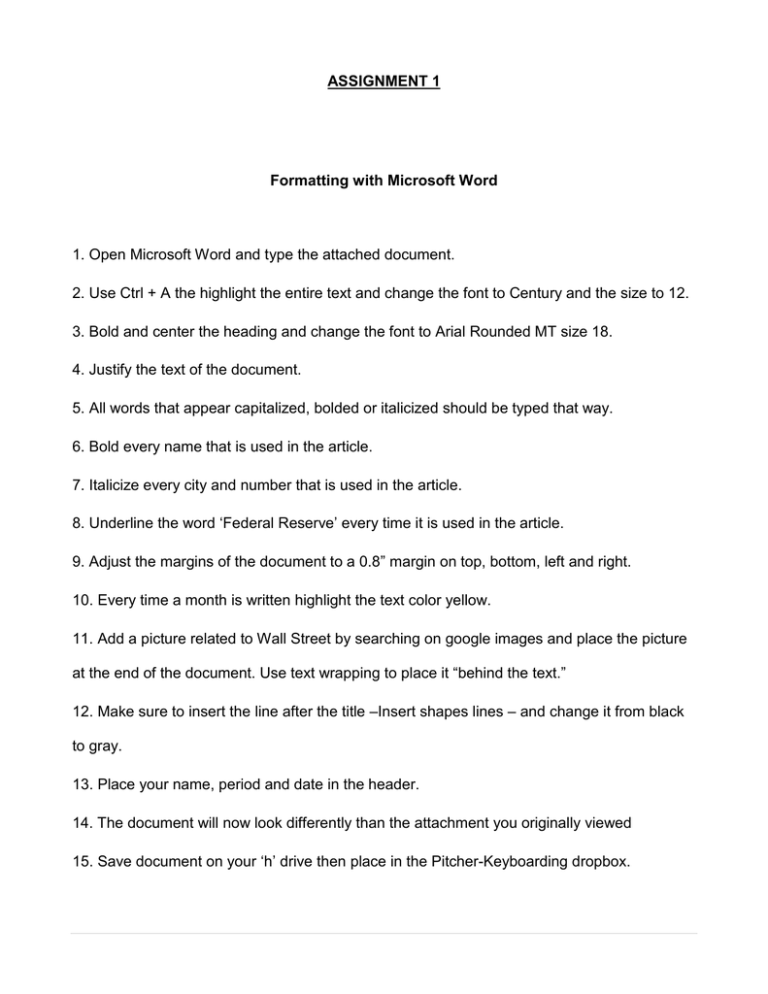
ASSIGNMENT 1 Formatting with Microsoft Word 1. Open Microsoft Word and type the attached document. 2. Use Ctrl + A the highlight the entire text and change the font to Century and the size to 12. 3. Bold and center the heading and change the font to Arial Rounded MT size 18. 4. Justify the text of the document. 5. All words that appear capitalized, bolded or italicized should be typed that way. 6. Bold every name that is used in the article. 7. Italicize every city and number that is used in the article. 8. Underline the word „Federal Reserve‟ every time it is used in the article. 9. Adjust the margins of the document to a 0.8” margin on top, bottom, left and right. 10. Every time a month is written highlight the text color yellow. 11. Add a picture related to Wall Street by searching on google images and place the picture at the end of the document. Use text wrapping to place it “behind the text.” 12. Make sure to insert the line after the title –Insert shapes lines – and change it from black to gray. 13. Place your name, period and date in the header. 14. The document will now look differently than the attachment you originally viewed 15. Save document on your „h‟ drive then place in the Pitcher-Keyboarding dropbox. Bernanke Staying the Course on Fed Policy Published on: Saturday, June 11, 2011 Written by: David Zeiler U.S. Federal Reserve Chairman Ben Bernanke stated the Fed would hold fast on rates and intimated he would not vote to extend the Fed’s program of purchasing U.S. Treasury bonds to help ease financial stress. Analysts say the move is tantamount to the Fed throwing up its hands, and is shifting the responsibility of recovery to the government through deficit reduction. For its part, the government continues to war over either raising the debt ceiling or raising taxes, which experts say continues to amount to an ineffectual stalemate. For more on this continue reading the following article from Money Morning. Despite the stream of data showing the U.S. economic recovery has yet to gain traction, U.S. Federal Reserve leaders are signaling there will be no change in monetary policy and that serious deficit reduction would be far more beneficial. In a speech to the International Monetary Conference Tuesday in Atlanta, U.S. Federal Reserve Chairman Ben S. Bernanke acknowledged "some loss of momentum" in the employment numbers - last week's payrolls report showed that companies added just 83,000 workers in May, down from 268,000 in April - but said the Fed can do little to combat the problems now holding the economy back. "The U.S. economy is recovering from both the worst financial crisis and the most severe housing bust since the Great Depression, and it faces additional headwinds ranging from the effects of the Japanese disaster to global pressures in commodity markets," Bernanke said. "In this context, monetary policy cannot be a panacea." Wall Street expressed its disappointment after Bernanke's remarks, erasing moderately positive gains from all the major indexes. "The markets are taking the comments as signs the economy is not really in the recovery mode, that Bernanke is going to hold off on rates for much longer than the market had anticipated before, well into 2012," Jonathan Xiong, a global investment strategist at Mellon Capital Management, told Reuters. Federal Reserve Bank of Dallas President Richard Fisher was far more blunt than Bernanke about the likelihood of a third round of quantitative easing (QE3) in remarks made Tuesday on CNBC. Fisher is a voting member on the policy-setting Federal Open Market Committee (FOMC). "What would more liquidity do? It's not being used. It's sitting on the sidelines. The gas tanks are full," Fisher said. Fisher told The Wall Street Journal he definitely would not vote to extend QE2 - the $600 billion Fed program of purchasing U.S. Treasuries scheduled to end June 30 - and did not think the Fed would spend much time considering it at the FOMC's next meeting June 20-21. "We've done an awful lot," Fisher told The Journal, referring to more than two years of near-zero interest rates as well as $2.79 trillion in various investment programs. Shrink the Deficit The overarching theme from Fed officials in recent days is that they have done all they can, and it's now up to the politicians to help the economy by reducing the federal deficit. "Policymakers urgently need to put the federal governments' finances on a sustainable trajectory," Bernanke said in Atlanta. "Establishing a credible plan for reducing future deficits now would not only enhance economic performance in the long run, but could also yield near-term benefits by leading to lower long-term interest rates." Congressional Republicans have been trying to use the debt ceiling issue - it must be raised by Aug. 2 to prevent the United States from defaulting - to exact budget cuts from their Democratic colleagues. Many Republican lawmakers have vowed to vote against raising the ceiling unless deficit-reducing cuts of $1 trillion over the next 10 years are part of the deal. The urgency of the debt ceiling issue could compel Congress to make some progress toward reducing the deficit, but fierce Democratic resistance to budget cuts -- and equally fierce Republican resistance to tax increases -- mean the final result probably won't come close to resembling the "credible plan" Bernanke has in mind. In his speech Bernanke was also careful to make the point that the weak economy would drive the Fed to put off tightening monetary policy for some time. "Although it is moving in the right direction, the economy is still producing at levels well below its potential; consequently, accommodative monetary policies are still needed," Bernanke said. "Until we see a sustained period of stronger job creation, we cannot consider the recovery to be truly established." Bernanke also continued to downplay worries over inflation, which the Fed would keep in check by raising interest rates. "Most FOMC participants currently see the recent increase in inflation as transitory and expect inflation to remain subdued in the medium term," the Fed chairman said. Other Fed leaders have echoed Bernanke's views. "I have to express some frustration with this economy," Dennis Lockhart, president of the Atlanta Fed, said in a speech on Tuesday. "I am wary of tightening monetary policy in the face of quite ambiguous economic circumstances unless doing so is absolutely necessary to meet the [Fed]'s price stability mandate." For the time being, it appears the Fed has adopted a "wait-and-see" policy. "I think that what we can take away from this is we're kind of steady as she goes right now," Thomas Simons, a money market economist at Jefferies & Co., told Reuters. "There is no reason to expect any move in policy one way or the other in the near future at all."
